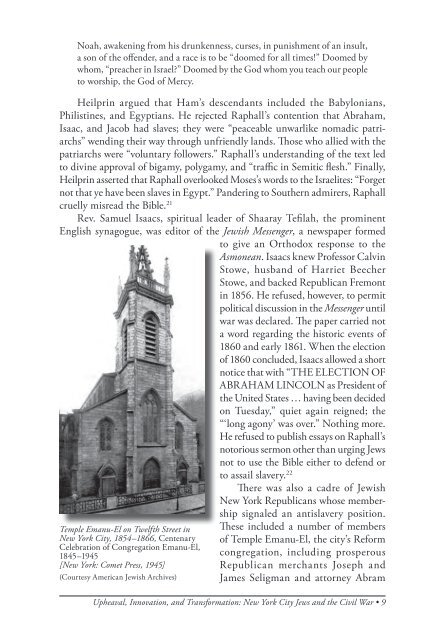American Jewish Archives Journal, Volume 64, Numbers 1 & 2
American Jewish Archives Journal, Volume 64, Numbers 1 & 2
American Jewish Archives Journal, Volume 64, Numbers 1 & 2
Create successful ePaper yourself
Turn your PDF publications into a flip-book with our unique Google optimized e-Paper software.
Noah, awakening from his drunkenness, curses, in punishment of an insult,<br />
a son of the offender, and a race is to be “doomed for all times!” Doomed by<br />
whom, “preacher in Israel?” Doomed by the God whom you teach our people<br />
to worship, the God of Mercy.<br />
Heilprin argued that Ham’s descendants included the Babylonians,<br />
Philistines, and Egyptians. He rejected Raphall’s contention that Abraham,<br />
Isaac, and Jacob had slaves; they were “peaceable unwarlike nomadic patriarchs”<br />
wending their way through unfriendly lands. Those who allied with the<br />
patriarchs were “voluntary followers.” Raphall’s understanding of the text led<br />
to divine approval of bigamy, polygamy, and “traffic in Semitic flesh.” Finally,<br />
Heilprin asserted that Raphall overlooked Moses’s words to the Israelites: “Forget<br />
not that ye have been slaves in Egypt.” Pandering to Southern admirers, Raphall<br />
cruelly misread the Bible. 21<br />
Rev. Samuel Isaacs, spiritual leader of Shaaray Tefilah, the prominent<br />
English synagogue, was editor of the <strong>Jewish</strong> Messenger, a newspaper formed<br />
to give an Orthodox response to the<br />
Asmonean. Isaacs knew Professor Calvin<br />
Stowe, husband of Harriet Beecher<br />
Stowe, and backed Republican Fremont<br />
in 1856. He refused, however, to permit<br />
political discussion in the Messenger until<br />
war was declared. The paper carried not<br />
a word regarding the historic events of<br />
1860 and early 1861. When the election<br />
of 1860 concluded, Isaacs allowed a short<br />
notice that with “THE ELECTION OF<br />
ABRAHAM LINCOLN as President of<br />
the United States … having been decided<br />
on Tuesday,” quiet again reigned; the<br />
“‘long agony’ was over.” Nothing more.<br />
He refused to publish essays on Raphall’s<br />
notorious sermon other than urging Jews<br />
not to use the Bible either to defend or<br />
to assail slavery. 22<br />
There was also a cadre of <strong>Jewish</strong><br />
New York Republicans whose membership<br />
signaled an antislavery position.<br />
Temple Emanu-El on Twelfth Street in<br />
New York City, 1854–1866, Centenary<br />
Celebration of Congregation Emanu-El,<br />
1845–1945<br />
[New York: Comet Press, 1945]<br />
(Courtesy <strong>American</strong> <strong>Jewish</strong> <strong>Archives</strong>)<br />
These included a number of members<br />
of Temple Emanu-El, the city’s Reform<br />
congregation, including prosperous<br />
Republican merchants Joseph and<br />
James Seligman and attorney Abram<br />
Upheaval, Innovation, and Transformation: New York City Jews and the Civil War • 9
















